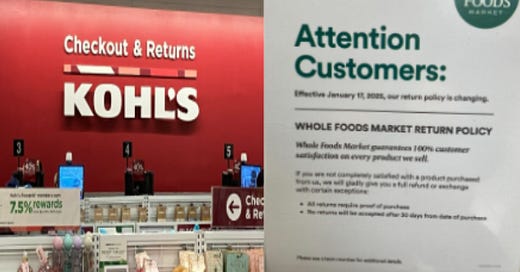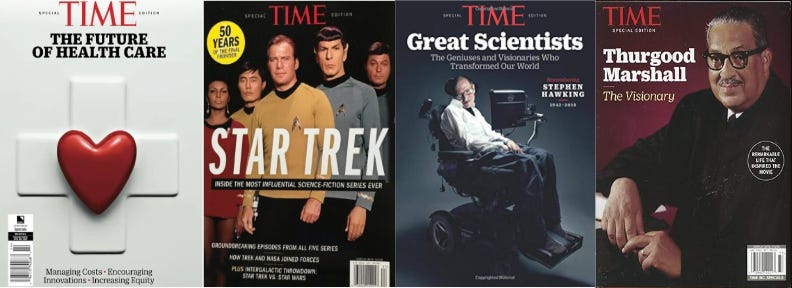A few weeks back I stopped into a large local bookstore, one of the few large bookstore chains still in operation. I planned to purchase a series of items including several birthday cards that I was going to need during the months ahead. I also picked up a magazine that I couldn’t help but notice as I approached the checkout line. I have a friend who is a middle school science teacher and I thought that she might be able to use this magazine for a current project she is working on with her eighth graders. This special edition magazine was one of those thick exclusives titled, Great Scientists - The Geniuses and Visionaries who Transformed our World. Hardly a magazine, I paid $14.99 for this special publication, a higher price than many of the books being sold at this bookstore. As my friend was not able to use the magazine that I had picked up for her science project, my plan was to eventually return it. The magazine never left the bag that it came in, had the original receipt tucked between its pages, and it sat in my vehicle until the day came when I had a chance to bring it back and get my refund.
A week later, I was back in the vicinity of this bookstore, the perfect opportunity to return the magazine. I was quickly informed at the return counter, however, that this bookstore does not take magazines back. Politely, I asked, why? The woman at the counter said, “I don’t know. It’s just our policy.” Not entirely satisfied, I asked if she could elaborate on that explanation, possibly providing a reason why such a policy existed. It was, after all, a really thick magazine, possibly even entering into book territory based on its length and price. She again said that she didn’t know. Another woman behind the counter jumped into the conversation in an effort to come to her colleague’s defense. She claimed that someone “could just read the magazine and then return it.” When I said that this could also be true in the instance of someone returning a book, she took on a look of defeat and walked away. After apparently gathering her thoughts, she quickly returned and told me that their return policy was two weeks. When I told her that I was easily within the two week period and showed her the date on my receipt she said, “Well, it’s just our policy,” and then turned and walked away for good. I was now the permanent owner of a comparatively expensive magazine about great scientists.
This policy prohibiting the return of a magazine that was on the shelf for $14.99 intrigued me. I decided to experiment with the time that I had left at this busy shopping plaza, so I set out to buy a few random items within the complex and then see if I could return them. I went into a nearby Kohl’s department store and began to look around reminding myself that it made absolutely no difference what I bought because I was going to return whatever I purchased anyway. On the other hand, I wanted to be careful not to buy something too expensive or cumbersome, such as a couch, in the event that I was not able to successfully return it. I found the perfect item, overly expensive and easy to carry. I picked up a package of Hanes underwear for $42.00. At the time, I happened to have a 30% off Kohl’s coupon with me but was sadly told that it was not in effect until the next day. Undeterred by the matter-of-fact delivery of the woman at the register who clearly enjoyed telling me that I could not use my coupon, I went ahead and bought the underwear happily paying full price. Walking with my bag of underwear from Kohl’s, I went right back to the bookstore and pulled a copy of the Paul Simon biography by Robert Hilburn off the shelf for $15.99, only one dollar more than the so-called magazine they would not let me return. Published several years ago, I had yet to read the book and figured it would be a good one to own in the event that the attendants at the checkout counter decided to identify it as a magazine and refused to take it back. I left the bookstore and headed to Whole Foods at the far end of the plaza. Always a fan of peas, I grabbed a bag of peas out of the frozen section and brought them to the register. Before the attendant had a chance to ring them up, I stopped him and asked if it would be possible for me to return the peas if I didn’t like them. Apparently on to my not so covert consumer investigation he assured me, “At Whole Foods you can return anything. Normally, you don’t even need a receipt.” I walked from Whole Foods over to Shoe Market with my underwear, the Paul Simon biography, and a bag of frozen peas, and promptly picked out a pair of shoes to buy. Before purchasing, however, I asked a Shoe Market employee about their return policy and was told that the store will take any footwear back for any reason within 30 days provided the shoes have not been worn outside. I went into Williams-Sonoma in search of a Waring blender having always been a fan of Warren Zevon, but I was told they do not carry that particular brand. The saleswoman, instead, sold me into a Breville and told me they would take it back for any reason within 30 days as long as I still had the original packaging.
I was now at virtual capacity carrying Hanes underwear, a paperback book, a bag of frozen peas, a pair of shoes, and a blender. Not to be outdone, I placed a quick call to a nearby appliance store. I told the service representative on the phone that I was interested in buying a refrigerator. After he gave me a quick rundown of what they had on the floor, I brought up the subject of returns. I was told that any appliance could be returned for any reason if a customer was not satisfied with the appearance or performance of the unit. “If somebody is not happy with something for any reason, they can certainly return it, even a refrigerator. We have a 100% satisfaction guaranteed policy,” the sales associate told me. “Even for a refrigerator,” he again added for emphasis.
I now felt like I had the consumer information I had been seeking. I went back to Kohl’s to return the $42.00 pack of underwear I had purchased only a short time before, and after briefly waiting for assistance, I was given a full refund. I took the shoes back to Shoe Market without incident, and the Breville blender back to Williams-Sonoma. I hurried over to the bookstore to return the Paul Simon paperback and was quickly given cash in return, although the same two women who had originally refused to take back my magazine rooted out my attempt to also include it as part of a combined return package. With the only act of petulant defiance I had left at my disposal, I told them that I had read the entire Paul Simon book before I left.
Magazines are unique, apparently, even the ones that are thicker than some books and cost $14.99. And while returning them is strictly against some unspecified social norm, take comfort in knowing that it is absolutely acceptable to return underwear, books, shoes, a blender, and even a refrigerator without consequence.
I never returned the peas. I ate them while reading about great scientists.
If you like my articles, please hit the “LIKE” button. It will help to let me know that you are enjoying my writing.
I welcome and invite you to COMMENT.
And please SHARE these posts! This gives added support to my Substack page and also helps to add new readers.
Thanks so much to anyone who is reading Journeys with Jay!








Great article Jay as always! Bill Mazeroski's magazine was the best ever and you pointed that out to me. Helped us get to know every player in MLB even the national league.
One of the advantages of buying from the big stores are their return policies. I rarely have a problem returning anything back to them. Even without a receipt, they will look it up in their computer system and find it. Worst case you’ll get a credit for something else. Guitar Center has a 30 day return policy. As a musician seeking the perfect instrument, you can’t beat that. Im 100% committed to supporting local mom and pop stores but I also have to think about the best value for my dollar.